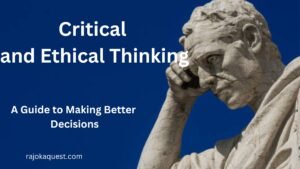Low Self-Confidence in Men: Understanding, Overcoming, and Thriving

Low Self-Confidence in Men: Understanding, Overcoming, and Thriving
Self-confidence is often considered an essential ingredient of success and personal fulfilment in our modern society. Many men, however, struggle with poor self-confidence, which can limit their potential in many spheres of their lives—from personal relationships to career successes. This thorough book investigates the fundamental reasons for low self-confidence in males, examines its effects, and offers doable plans to help men develop and maintain a better feeling of self-confidence.
Understanding Self-Confidence
What is Self-Confidence?
Self-confidence is a conviction of one’s ability and intrinsic value. It’s more than just a fleeting emotion; it’s a strong belief that helps people approach chances and problems confidently. Men’s sense of self can be strengthened or undermined depending on how self-confidence interacts with personal experiences and societal expectations.
Why Do Men Get Low Self-Confidence?
Societal Expectations and Gender Norms
Self-confidence can be significantly affected by the need to fit conventional ideas of masculinity—that is, by displaying achievement, emotional reserve, and strength. Men’s unrealistic expectations resulting from these societal expectations can cause emotions of inadequacy when they fall short. While negotiating these expectations can be difficult, changing conventional masculinity and adopting a more inclusive perspective of gender roles can assist in lessening these demands.
The Role of Past Experience
Early contacts and events in childhood significantly affect self-confidence. Men who experience negative reinforcement, criticism, or lack of support throughout their early years could bring these concerns into adulthood. These early events can cause self-doubt and lower self-esteem throughout life. Therapeutic interventions and reflection help one heal and boost self-confidence by addressing past events.
Impact of Social Media and Comparisons
Social media sometimes magnifies feelings of inadequacy by presenting perfect versions of life. Men who constantly view well-chosen pictures and success tales may start to feel inadequate compared to others. By establishing arbitrary standards for achievement and self-worth, this warped perspective can undermine confidence. Using social media mindfully and emphasizing personal accomplishments and real-life interactions will help to offset this impact.
Problems in Mental Health
Depression and anxiety, among other mental health disorders, can seriously affect self-confidence. These disorders can skew self-perception, hence increasing self-doubt and lowering self-esteem. Improving self-confidence and general well-being requires first addressing mental health through treatment, medication, and self-care habits.
Consequences of Low Self-Confidence
Career and Professional Life
Low self-confidence can seriously impede job advancement. Men who lack self-confidence may be reluctant to assert their ideas, pursue promotions, or assume greater responsibility. Their careers may stagnate, and missed possibilities may follow from this resistance. In the workplace, developing self-confidence calls for well-defined career goals, mentoring, and active participation in professional growth.
Relationships and Social Interactions
Building and preserving good relationships depend much on self-confidence. Men who lack self-confidence could find it difficult to be intimate, forceful, or communicate, which would sour personal connections. Problems include insecurity, envy, and people-pleasing actions that can cause conflict among spouses, friends, and family members. Boosting self-confidence calls for practising good communication, establishing reasonable limits, and asking for help from reliable people.
Personal Fulfillment and Happiness
Insufficient self-confidence can affect general happiness and personal fulfilment. Self-doubt can cause men to feel inadequate in their interests or reluctant to follow their hobbies. This could cause one to lose satisfaction and a sense of direction. Pursuing passions, creating personal objectives, and commemorating successes—all of which help one develop self-confidence—helps one experience more fulfilment and happiness.
Strategies for Building Self-Confidence
Self-Awareness and Reflection
Dealing with low self-confidence calls for developing self-awareness. Through journaling, therapy, or introspective activities, self-reflection can help one spot triggers and harmful thought patterns. Knowing the underlying reasons for low self-confidence makes focused treatments and personal development possible.
Setting and Achieving Realistic Goals
Establishing and reaching reasonable goals will help one develop self-confidence bit by bit. Start with chores that play to your aptitudes, then challenge yourself. Celebrating these achievements, no matter how small, allows one to develop self-belief and inspire further development. Create realistic and robust goals using the SMART (Specific, Measurable, Achievable, Relevant, Time-bound) model.
Utilizing Positive Affirmation
Positive affirmations are powerful strategies for boosting self-confidence. Replace negative ideas with affirmations stressing your accomplishments and abilities. Frequent repetition of these affirmations helps you change your perspective and develop a better self-image. To help you strengthen your self-belief, make a list of affirmations that speak to your own values and objectives.
Creating Competencies and Skills
Funding skill development increases self-confidence. Whether through formal education, training, or personal interests, increasing your competency and bolstering self-confidence helps you Accept chances for personal development and education and see obstacles as opportunities to acquire fresh abilities.
Creating a Support System
Developing self-confidence depends on surrounding yourself with motivating people. Look for support groups, friends, or mentors who will help you validate your value by providing helpful criticism. Good social contacts can provide validation and inspiration as well as help offset feelings of inadequacy.
Examining Mental Health
If poor self-confidence is connected to mental health problems, one should seek expert advice. Counselling or therapy can offer techniques for controlling negative ideas and feelings and enhancing general well-being and self-confidence. Appropriate interventions addressing mental health issues can significantly affect self-confidence.
Establishing Mindfulness and Self-Care
Regular exercise, a good diet, and mindfulness, among other self-care activities, help one develop a good self-image and general well-being. Deep breathing exercises and meditation, among other mindfulness techniques, assist in controlling stress and foster a reasonable view of self-worth. Add self-care to your daily schedule to help with mental and physical wellness.
Accepting Transparency and Originality
Accepting vulnerability and sincerity helps boost confidence. Let yourself be honest and candid, noting your areas of strength and room for development. Being authentic helps one develop self-acceptance and trust, improving one’s self-image. Accepting your actual self helps you build closer relationships and more self-worth.
Overcoming Obstacles and Tenacity
Establishing self-confidence requires strengthening in the face of adversity. See setbacks as chances for development rather than causes of self-doubt; learn from them. Resilience strengthens your capacity to overcome obstacles and keep on the path of your goals, boosting your confidence.
Developing a Growth Mindset
Building self-confidence requires a change of perspective toward growth. See obstacles as chances for growth and emphasize always improving rather than perfection. Adopting a growth perspective helps you tackle challenges with a good attitude and a readiness to develop and learn.
Building Healthy Habits
Developing good habits helps one feel confident and good about oneself. Make activities that support mental and physical health a top priority: consistent exercise, enough sleep, and hobby participation you enjoy. Good habits boost self-confidence and help promote a balanced life.
Seeking Feedback and Growth Opportunities
Get comments actively and welcome chances for improvement. While growth chances assist you in acquiring new abilities and boosting self-confidence, constructive comments offer insightful analysis and affirmations. Get comments from reliable people and participate in activities meant to test and improve your skills.
Celebrating Success
Frequent recognition and celebration of your successes strengthen your self-belief and drive. Acknowledge and value your achievements, though little, since they help to shape a good self-image. Celebrating accomplishments keeps one confident and hopeful.
Maintaining Consistency
Development and maintenance of self-confidence depend on consistency. Make self-improvement a regular habit, and keep using the techniques that help you have a good self-image. Regular efforts enhance long-term development and help to strengthen self-belief.
The power of Self-Compassion
Self-compassion is treating yourself kindly and sympathetically, particularly in trying circumstances or when facing a setback. Practice self-compassion by appreciating your efforts and providing yourself with support rather than rigorous self-criticism. By encouraging a more loving and good self-relationship, self-compassion builds resilience and self-confidence.
Increasing Emotional Intelligence
Emotional intelligence (EI) enhances self-confidence. Growing emotional awareness and control, as well as empathy for others, constitute part of developing emotional intelligence. Greater self-confidence results from high emotional intelligence, which improves self-awareness, communication abilities, and interpersonal interactions.
Embracing Lifelong Learning
You are dedicated to lifelong learning as a path of personal development and self-improvement. Participate in activities that enhance your knowledge and abilities; approach learning with openness and interest. By improving your capacities and flexibility, lifelong learning helps you to develop self-confidence.
The Importance of Reflection and Adjustment
Ask yourself often about your development and adapt as necessary. Self-evaluation helps you see your development, pinpoint areas needing work, and honour successes. Reflecting helps you modify your approaches and objectives to continuously grow and maintain self-confidence.
Balancing Ambition and Self-Acceptance
Maintaining confidence requires a balance between ambition and self-acceptance. While you pursue your objectives with will, equally acknowledge and embrace your present strengths and constraints. Striking a balance between ambition and self-acceptance helps one to see realistically and positively.
Creating a Vision Board
One visual reminder of your aims and aspirations can come from a vision board. Build a board reflecting your ideals, successes, and intended results. By having your goals in front of you, routinely reviewing your vision board can inspire drive and boost self-confidence.
Conclusion
Developing self-confidence is a road trip that calls self-compassion,e, and if, fort. Men can create a stronger sense of self-assurance by knowing the elements causing poor self-confidence, appreciating their influence, and using sensible plans. Remember that self-confidence is about accepting your unique traits and abilities rather than perfection; embrace each stage of the journey with an open mind and heart. You may convert low self-confidence into a potent weapon for reaching your objectives and guiding a meaningful life using perseverance, self-compassion, and proactive initiatives.
To read more, Click Here..





